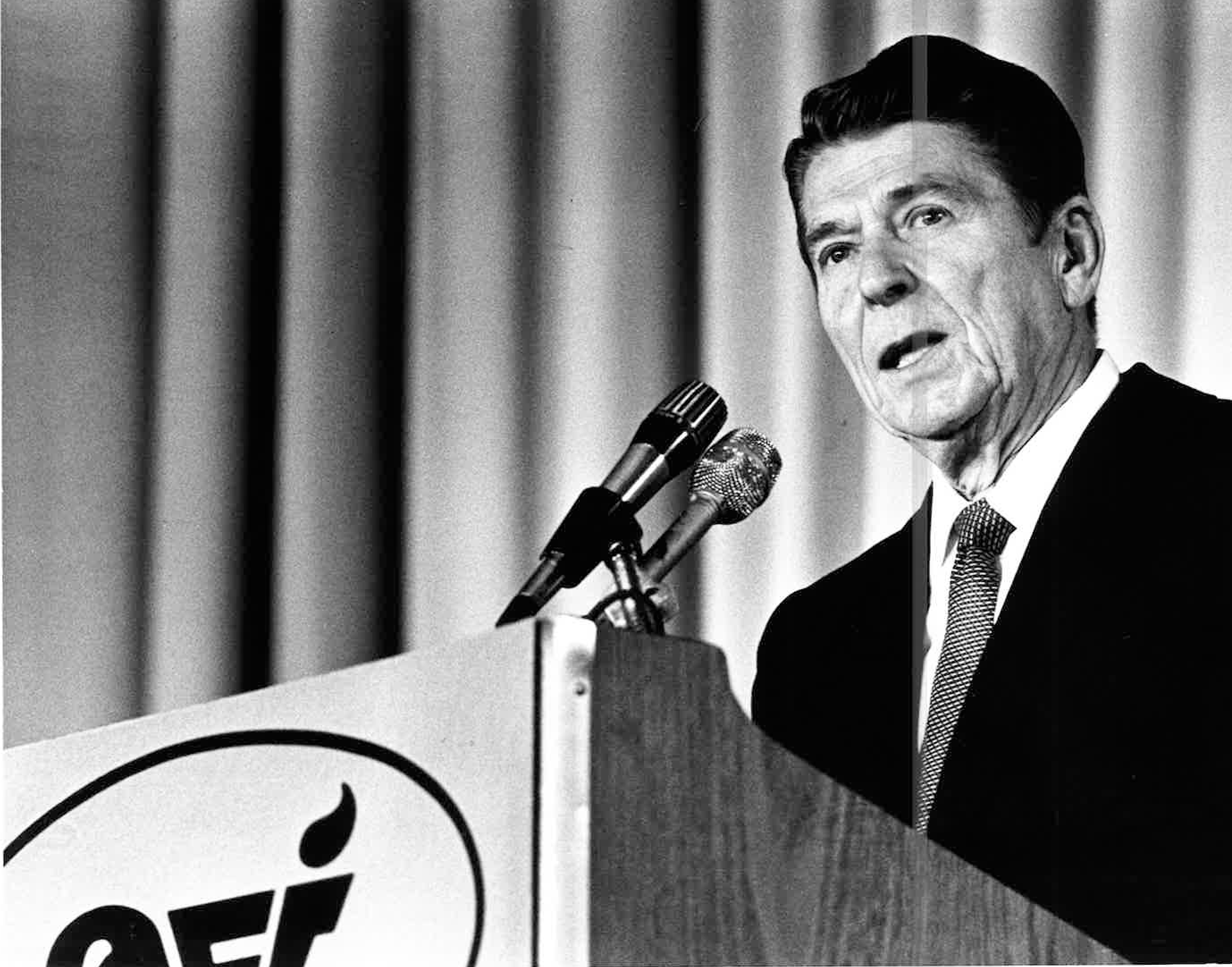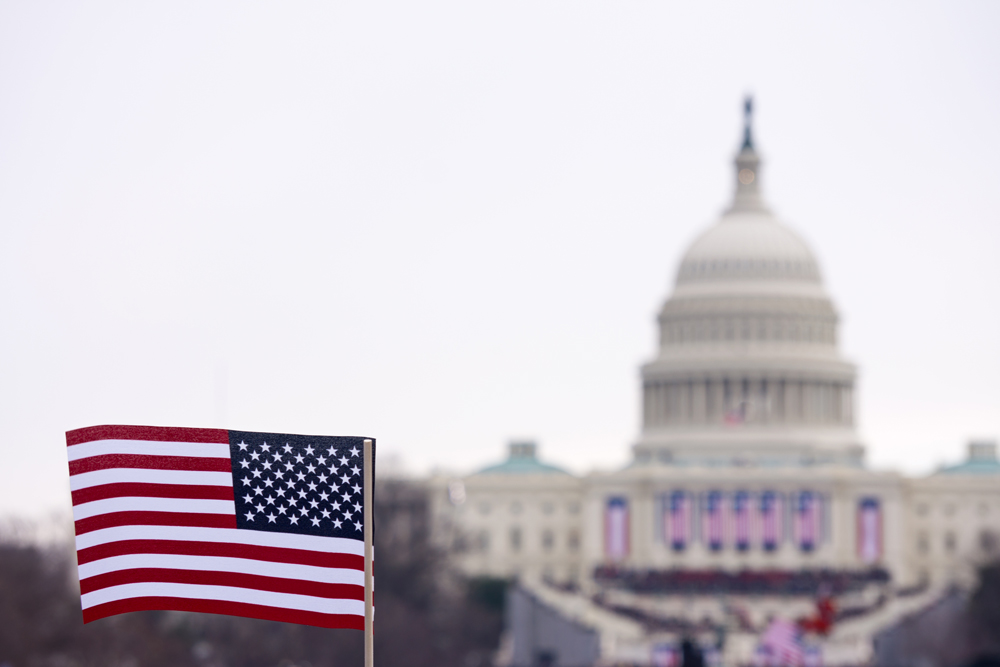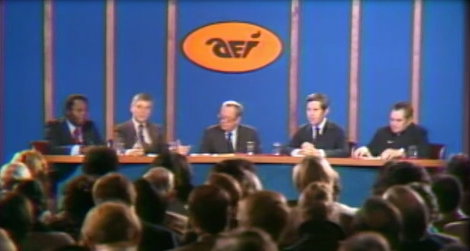
AEI Archives: Political and Social Processes
Ronald Reagan speaks at an AEI event.
Political and Social Processes History
Since AEI’s move to Washington in 1943, it has been a vital player in shaping domestic policy debates. The political and social turmoil of the 1960s and 1970s raised fundamental questions about the American political system and its core institutions and values. In response, AEI developed a new approach that went beyond analyzing formal laws and policies. The focus shifted to understanding the ideas and institutions that underpin the American system and their connection to people’s values.
A major AEI study on Congress appearing in 1966, Congress, the First Branch of Government, described how it functions and might be aided in its work to achieve a good society, counting as part of that good society the legislative way of life. AEI’s Program on Political and Social Processes was initiated in 1977, and it served as the foundation for research on US political and social institutions. The program included AEI’s work on the American presidential selection process and the At the Polls series, which examined elections in democratic countries.
AEI’s other domestic policy work examined health care, legal, and educational policy issues. To ensure that AEI’s best work was known by and available to those who made or influenced public policy, the Institute had a comprehensive publications program that included books, monographs, and magazines and sponsored scores of conferences, lectures, debates, and seminars. Today, a much larger AEi has expanded the Institute’s early work in political and social processes and institutions and has returned to robust studies of the Constitution.
Selected Political and Social Policy Publications
Studies

Health Policy
In the summer of 1972, AEI started its work on health care policy. In a joint conference with Duke University, AEI hosted health care experts from across the nation to discuss the rising need for health services and increased demands for government intervention. The conference followed that year’s Rational Debate program on the topic of national health insurance and economist Rita Ricardo-Campbell and Glenn Campbell’s 1960 AEI book Voluntary Health Insurance in the United States.
AEI, barring a few publications from the postwar era, was still new to the field of health policy. In 1974, AEI announced a Health Policy Center to intensify the Institute’s existing efforts in health research. Economist Robert B. Helms was named the center’s staff director. Irvine Page, editor of Modern Medicine, was selected as chairman of the advisory committee, which included economist Paul W. McCracken, sociologist Robert A. Nisbet, law professor Clark C. Havighurst, physician and professor of medicine Louis Lasagna, and Ricardo-Campbell. Two AEI adjunct scholars, Yale Brozen and William M. Wardell, and two staff members, economists Thomas F. Johnson and David M. O’Neill, were selected to work with the center. It published its first two papers about government subsidies for hospital construction and regulation of pharmaceutical innovations in 1974. The Institute continues to produce much important work in the area of health policy.
Selected Studies

Legal Policy
Judicial power has always been the subject of controversy in the United States. In Democracy in America, Alexis de Tocqueville wrote, “Scarcely any political question arises in the United States that is not resolved, sooner or later, into a judicial question.” AEI’s early work examined the courts’ involvement in issues considered by many to be properly executive or legislative matters. Growing out of an extensive program on antitrust law, AEI studies in legal policy were initiated in 1974 and have focused through the years on judicial power and the judiciary’s relationship with other branches of government.

Political Institutions
AEI initiated a series of studies by a group of political and behavioral scientists in June 1965 to examine the US government’s legislative foundations. Eleven scholars, working through the coordinating efforts of political scientist Alfred de Grazia of New York University, met together and in smaller groups several times in the summer of 1965 for discussions. The purpose of the AEI special study group was to describe how Congress functions and how it might be aided in its work to achieve a good society, counting as part of that good society the legislative way of life.
AEI’s commitment to the competition of ideas is illustrated by one of its popular Rational Debate programs around this time. Titled “Congress and the Presidency,” historian Arthur M. Schlesinger Jr. and de Grazia debated in 1967 whether the presidency had too much power. In the 1970s, the distinguished political scientist J. Austin Ranney, who headed AEI’s political work, brought many scholars to AEI, including political scientist Jeane Kirkpatrick, former Census Bureau director Richard Scammon, political scientists Howard Penniman and Norman Ornstein, and author Ben J. Wattenberg.
In 1978, AEI launched a popular niche magazine called Public Opinion that regularly reviewed the nation’s opinions on Congress and other key institutions. The editors, sociologist Seymour Martin Lipset and author Ben J. Wattenberg (with political scientist Everett Carll Ladd), interviewed prominent political pollsters, regularly reviewed exit poll findings, and provided assessments of the nation’s mood and public opinion on the day’s controversies.
Selected Studies
Selected Special Analyses
Selected Public Policy Forums
Public Opinion Magazine
Continuity and Transition Projects
At the Polls Series
Congress Project
In 1982, the Congress Project released the first full volume of the highly acclaimed reference book Vital Statistics on Congress. Another publication, Congress Off the Record: The Candid Analyses of Seven Members (AEI Press, 1978), provided a unique perspective by capturing candid views of a group of new congresspeople who were guaranteed anonymity. Other publications included perspectives on presidential debates and suggestions for congressional reforms under the Renewing Congress project of the 1990s. Vital Statistics continues to this day under the auspices of the Brookings Institution, with which AEI scholars have worked and continue to work on congressional reform.
Selected Congress-Related Publications
Constitution Project
AEI launched a project called A Decade of Study of the Constitution in the 1970s, which encouraged serious constitutional study in anticipation of the Constitution’s bicentennial in 1987. AEI political scientists Robert Goldwin and William Schambra directed the project and convened scholars with different perspectives to discuss controversies that arose at the time of the country’s founding and continue to this day. Volumes such as How Democratic Is the Constitution? (AEI Press, 1980) and How Capitalistic Is the Constitution? (AEI Press, 1982) illuminated those discussions.The last volumes in the 10-volume series were produced in 1990.
Read Bicentennial Lectures
Irving Kristol: The American Revolution as a Successful Revolution (St. John’s Church, Washington, DC)
Martin Diamond: The Revolution of Sober Expectations (Independence Square, Philadelphia, PA)
Paul G. Kauper: The Higher Law and the Rights of Man in a Revolutionary Society (Old North Church, Boston, MA)
Robert A. Nisbet: The Social Impact of the Revolution (Gaston Hall at Georgetown University, Washington, DC)
Gordon S. Wood: Revolution and the Political Integration of the Enslaved and Disenfranchised (House of Representatives’ chamber, Kentucky State Capitol)
Caroline Robbins: The Pursuit of Happiness (Gallier Hall, New Orleans, LA)
Peter Berger: Religion in a Revolutionary Society (Christ Church, Alexandria, VA)
G. Warren Nutter: Freedom in a Revolutionary Economy (Wren Building at the College of William & Mary, Williamsburg, VA)
Vermont Royster: The American Press and the Revolutionary Tradition (Dinkelspiel Auditorium at Stanford University, Stanford, CA)
Edward C. Banfield: The City and the Revolutionary Tradition (Franklin Hall at the Franklin Institute, Philadelphia, PA)
Leo Marx: The American Revolution and the American Landscape (Cabell Hall at the University of Virginia, Charlottesville, VA)
Ronald S. Berman: Intellect and Education in a Revolutionary Society (Grace Rainey Rogers Auditorium at the Metropolitan Museum of Art, New York City, NY)
Kenneth B. Clark: The American Revolution: Democratic Politics and Popular Education (Little Red Schoolhouse, St. Charles, MN)
Forrest Carlisle Pogue: The Revolutionary Transformation and the Art of War (United States Military Academy, West Point, NY)
Seymour Martin Lipset: Opportunity and Welfare in the First New Nation (Henry Ford Museum, Dearborn, MI)
Charles Burton Marshall: American Foreign Policy as a Dimension of the American Revolution (Benjamin Franklin Room at the Department of State, Washington, DC)
Dean Rusk: The American Revolution and the Future (Ford’s Theatre, Washington, DC)

Social Policy
Originally combined with AEI’s political research under the Political and Social Processes division, AEI has conducted a dynamic program of research on social issues. AEI’s social programs were far from just intellectual exercises: They were at the forefront of shaping public policy. To take just one area, in the 1970s, AEI scholar Michael Novak convened a seminar of academics with different points of view to discuss welfare policy. The New Consensus on Family and Welfare(AEI Press and Marquette University, 1987) was enormously influential. It was the first public document to recommend a work requirement for welfare, and it became the basis of the 1996 Welfare Reform Act.
In the Institute’s early history, AEI scholars were attentive to the role of mediating structures—family, churches, neighborhoods, voluntary associations, and ethnic groups—in the nation’s life. But it wasn’t until 1976 that formal work in this area began in earnest. A neighborhood revitalization program (NRP) began conceptually when William J. Baroody Jr. assumed top leadership at AEI. In 1977, neighborhood revitalization became the topic of a University of Southern California visit by President Gerald Ford, who had joined AEI formally, and a panel discussion was held in conjunction with the AEI Project on Mediating Structures.
Also in 1977, AEI published To Empower People. Written by sociologist and theologian Peter L. Berger and theologian Richard John Neuhaus, it discussed the importance of mediating institutions and the negative impact of government activities on them. The 40-page pamphlet was enormously influential, and a 20th-anniversary edition was published in 1996, with additional essays about the original by distinguished scholars. Under the leadership of Robert Woodson and Cicero Wilson, the NRP hosted several major conferences with neighborhood leaders; partnered with churches, government institutions, and nonprofits to encourage investment in under-resourced neighborhoods; and became a unique space in Washington, DC, to empower communities.
In 1986, amid unprecedented financial difficulties for AEI, the organization announced it would phase out the projects. Despite their end, the NRP’s and Mediating Structures Project’s contributions to community development and organizing nationwide would be felt for generations to come. The work on the importance mediating institutions continues at AEI to this day.
Selected Community Project Publications
Selected Public Safety Net Series and Misc. Studies
Education Policy
In the 1950s, authors at the American Enterprise Association questioned the wisdom of greater federal involvement in education policy, and the monograph “Education in Review” was widely covered by the press. AEI continued to raise concerns in this area, and in 1981, education reformer Denis Doyle joined AEI and within the year became director of its new education policy program.
Doyle, who brought government experience to this work, believed that the United States was at a crucial turning point in the field of education and emphasized that the upcoming years presented both great vulnerability and great opportunity for it. Doyle’s concerns were substantiated when the program’s first studies released in the spring and summer of 1983 confirmed a significant decline in the quality of American schools. The program evaluated national, state, and local education issues and the interplay between education and other aspects of American life, conducting research on the influence of education on productivity, employer-based education and training, industry-education partnerships, and applied and basic science.
Doyle wrote a popular case study on public school teachers who sent their children to private schools. Essays produced by the program were featured in national publications such as the Washington Post and Wall Street Journal and specialized education publications such as American Education magazine and Phi Delta Kappan. Today, political scientist and educator Frederick M. Hess heads AEI’s education policy group, known for forward-thinking work in many areas of education policy.
Religion and Philosophy
AEI President William J. Baroody Sr. was the first think tank head to appreciate the role religion would play in public policy, and he had great interest in AEI’s work in the area. In 1976, sociologist Peter L. Berger delivered a lecture at Christ Church in Alexandria, Virginia. The lecture, titled “Religion in a Revolutionary Society,” was part of a bicentennial series organized by AEI and offered insightful reflections on the evolving landscape of American religion. Berger contended that “the change since [the American Revolution] can be conveniently summed up by saying that more and more people have concluded that their world is not okay, and religion has lost much of its ability to persuade them that it is.”
Berger’s address foreshadowed a significant new focus of AEI. In 1978, theologian Michael Novak joined the Institute. A renowned scholar of Catholic thought, poverty, and foreign affairs (and former speechwriter for Democratic vice presidential candidate Sargent Shriver), Novak injected new vitality into AEI’s early religious research programs. He became the first director of AEI’s Center for Religion, Philosophy, and Public Policy, which was officially named in 1984. In 1978, AEI’s popular Conversation With . . . series featured Leon Kass on the subject of in vitro fertilization. Kass joined the Institute as a visiting fellow for the first time in 1991 and became a resident scholar later. The author of books such as The Beginning of Wisdom: Reading Genesis (Simon & Schuster, 2003) and Founding God’s Nation: Reading Exodus (Yale University Press, 2021), Kass headed President George W. Bush’s Bioethics Council.




























